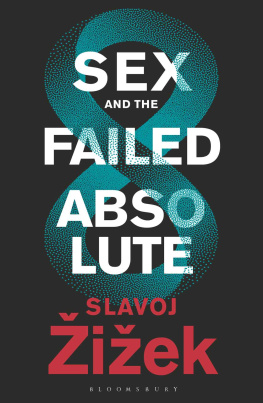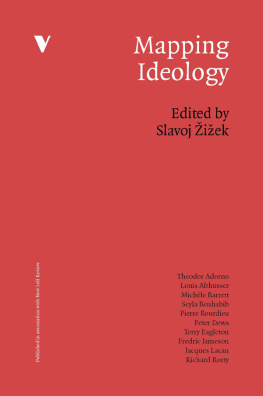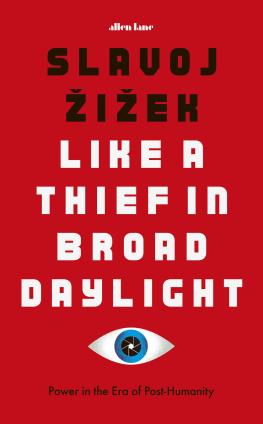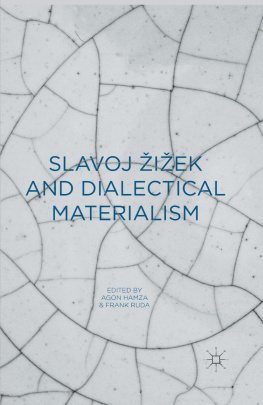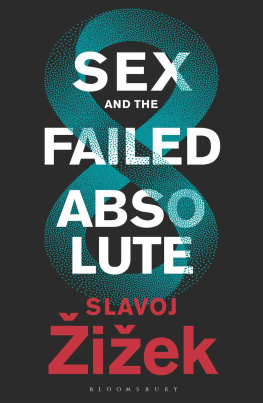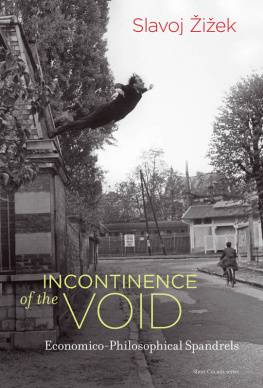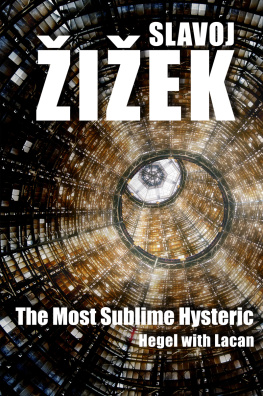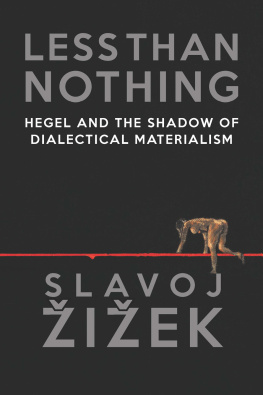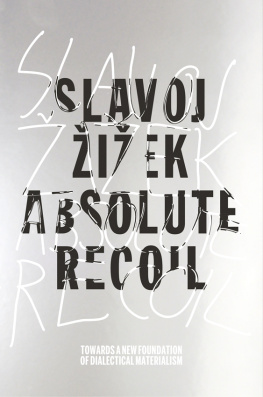
Sex and the Failed Absolute
ALSO AVAILABLE FROM BLOOMSBURY
Disparities, Slavoj iek
Antigone, Slavoj iek
There is great chaos under heaven,
so my situation with Jela is excellent!

Contents
The Unorientable Space of Dialectical Materialism
In his About Our Revolution, Lenin mentions Napoleon as saying On sengage et puis on voit. Although it was never proved that Napoleon actually said or wrote these words (which can be freely translated as One jumps into the fray, and then one figures out what to do next), they certainly capture his spirit. But can we still afford this stance in our era, when jumping into the fray may also mean pressing the button (thereby launching a nuclear attack)? Today is the time for thinking, and on se retire pour mieux voir, et puis on attacque seems more appropriate than its Napoleonic opposite: to see, one has to withdraw and acquire a minimal distance. This holds not only for politics, but also for sexnot only for thinking about sex but for sex itself, which always relies on a minimal withdrawal, a withdrawal which is not a retreat into passivity but perhaps the most radical act of them all.
The title of this bookSex and the Failed Absoluteoffers itself to two interconnected common readings: (1) when religion or any other belief in an Absolute fails, unbridled
Female orgasm as a new version of the ontological proof of god instead of dismissing this as a version of the obscurantist New Age speculation (which it is!), we should undermine it from within: the description of intense sexual act as the experience of the highest and most intense unity of Being is simply wrong, it obfuscates the dimension of failure, mediation, gap, antagonism even, which is constitutive of human sexuality. This minimal reflexivity that cuts from within every immediate orgasmic One is the topic of the present book. How can this be in a book focused on the most elementary big philosophical questions (the nature of reality, etc.)? How can we do this without regressing into a premodern sexualized vision of the cosmos as the space of an eternal struggle between masculine and feminine principles (yin and yang, light and darkness )? The main chapters will explore this paradox; at this introductory moment, it is enough to insist on the purely formal nature of the reflexivity we are talking about. In mathematics, the convoluted structure implied by such reflexivity is called unorientable: an unorientable surface is a surface (the Mbius strip and its derivations, the cross-cap and Klein bottle) on which there exists a closed path such that the directrix is reversed when moved around this path. On a such surface, there is no way to consistently define the notions of right or left, since anything that is slid on it will come back to its starting point as a mirror image. The first premise of the present book is that the theoretical space of dialectical materialism is exactly such a convoluted space, and that it is this convolution, this self-relating circular movement of falling-back-into-oneself, which distinguishes dialectical materialism proper from other forms of pseudo-dialectical materialism which merely assert the nature of reality as an eternal struggle of opposites.
The obvious counter-argument that arises here is: but why refer to dialectical materialism, why bring back to life this arguably most discredited orientation of twentieth-century philosophy, the orientation which is not only philosophically worthless and unproductive but also stands for state philosophy at its worst and served as the ideological instrument of monstrous political oppression? The first thing to note here is that, if we forget its ideological-political context and take the term dialectical materialism in its immediate meaning, it adequately captures the spontaneous philosophy of most modern scientists: a large majority of them are materialists who conceive reality in (what is commonly perceived as) a dialectical wayreality is a dynamic process permanently in motion, a process in the course of which gradual contingent change culminates in sudden reversals and explosions of something new, etc. I am, of course, not following this path of trying to save the rational core of dialectical materialism from its Stalinist caricature: my opposition to Stalinist dialectical materialism is much more radical. Stalin enumerated four features of dialectical materialism:
Contrary to metaphysics, dialectics does not regard nature as an accidental agglomeration of things, of phenomena, unconnected with, isolated from, and independent of each other, but as a connected and integral whole, in which things, phenomena, are organically connected with, dependent on, and determined by each other.
Contrary to metaphysics, dialectics holds that nature is not a state of rest and immobility, stagnation and immutability, but a state of continuous movement and change, of continuous renewal and development, where something is always arising and developing, and something always disintegrating and dying away.
Contrary to metaphysics, dialectics does not regard the process of development as a simple process of growth, where quantitative changes do not lead to qualitative changes, but as a development in which the qualitative changes occur not gradually, but rapidly and abruptly, taking the form of a leap from one state to another.
Contrary to metaphysics, dialectics holds that internal contradictions are inherent in all things and phenomena of nature, for they all have their negative and positive sides, something dying away and something developing; and that the struggle between these opposites constitutes the internal content of the process of development.
If we oppose to Stalins dialectical materialism as a new version of general ontology (lets call it DM1) our dialectical materialism of a failed ontology (DM2), we can also contrast each of Stalins four features with the four features of DM2:
Contrary to DM1 which ascertains that everything is connected with everything else in a complex network of interrelations, DM2 starts with separation, cut, isolation: to get to the truth of a totality, one must first tear out, isolate, its key feature, and then view the whole from this unique partial standpoint. Truth is not balanced and objective, it is subjective, one-sided.
Contrary to DM1 which emphasizes sudden leaps and violent revolutionary changes, DM2 focuses on the function of delays and dead time in gestation: for structural reasons, leaps happen too early, as premature failed attempts, or too late, when everything is already decided. As Hegel put it, a change takes place when we notice that it has already taken place.
Contrary to DM1 which emphasizes overall progress from lower to higher stages, DM2 perceives the overall situation as that of an unorientable structure: progress is always localized, the overall picture is that of a circular movement of repetition, where what is today reactionary can appear tomorrow as the ultimate resort of radical change.
Contrary to DM1 which interprets antagonism as opposition, as the eternal struggle of opposites, DM2 conceives antagonism as the constitutive contradiction of an entity with itself: things come to be out of their own impossibility, the external opposite that poses a threat to their stability is always the externalization of their immanent self-blockage and inconsistency.
Another way to draw a line of distinction between DM1 and DM2 would be with regard to the notion of scientific view of reality thus cannot really account for its own emergencebut, similarly, the transcendental-ontological approach cannot explain the fact of contingent external reality, so the gap between the two is irreducible. Does this mean that the duality of ontic and ontological is our last word, a fact beyond which we cannot reach?
Next page
